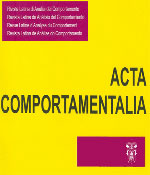Uma Explicação Não-Causal do Comportamento no Behaviorismo Radical
Contenido principal del artículo
Resumen
Este ensaio tem como objetivo examinar a possibilidade de uma explicação não-causal do comportamento na perspectiva behaviorista radical. Em primeiro lugar, os componentes essenciais do pensamento causal são descritos, a saber, condicionalidade; unicidade; conexão necessária; dependência unilateral; e conexão genética. Argumenta-se que, com exceção da condicionalidade, o Behaviorismo Radical rejeita os demais aspectos. Com isso, torna-se plausível a defesa de uma interpretação não-causal do modelo explicativo do comportamento no Behaviorismo Radical. Em segundo lugar, apresenta-se uma proposta de explicação não-causal do comportamento, baseada nas relações de interdependência funcional entre eventos, estados e processos. A partir dessa proposta, explicar deixa de ser sinônimo de busca pelas causas do comportamento, para se identificar com a descrição do funcionamento do fluxo comportamental. Conclui-se que eventuais ambigüidades encontradas no texto skinneriano com respeito à explicação do comportamento podem ser superadas: 1) abandonando-se a lógica e o vocabulário da causalidade, e 2) adotando-se uma explicação dinâmica do comportamento.
Detalles del artículo
Cómo citar
Lautenti, C., & Lopes, C. E. (2010). Uma Explicação Não-Causal do Comportamento no Behaviorismo Radical. Acta Comportamentalia: Revista Latina De Análisis Del Comportamiento, 16(3). Recuperado a partir de https://journals.unam.mx/index.php/acom/article/view/18120
Citas en Dimensions Service

<a rel="license" href="http://creativecommons.org/licenses/by-nc-sa/4.0/"><img alt="Licencia de Creative Commons" style="border-width:0" src="https://i.creativecommons.org/l/by-nc-sa/4.0/88x31.png" /></a><br />Este obra está bajo una <a rel="license" href="http://creativecommons.org/licenses/by-nc-sa/4.0/">licencia de Creative Commons Reconocimiento-NoComercial-CompartirIgual 4.0 Internacional</a>.
